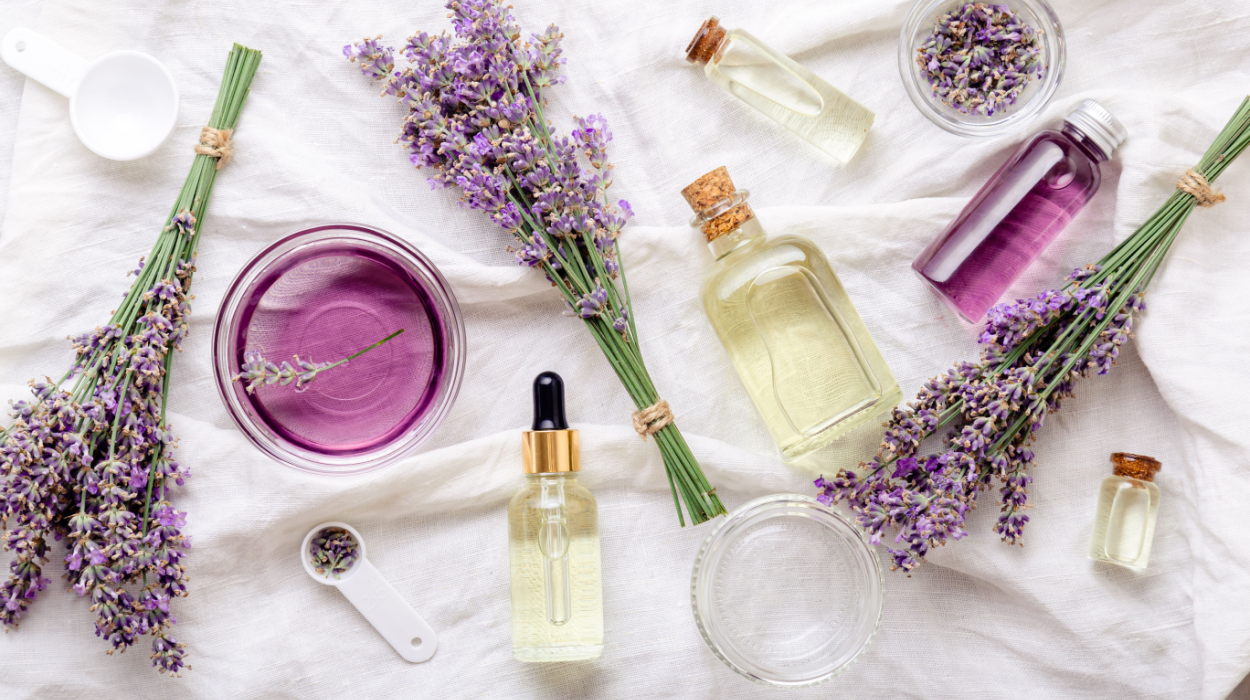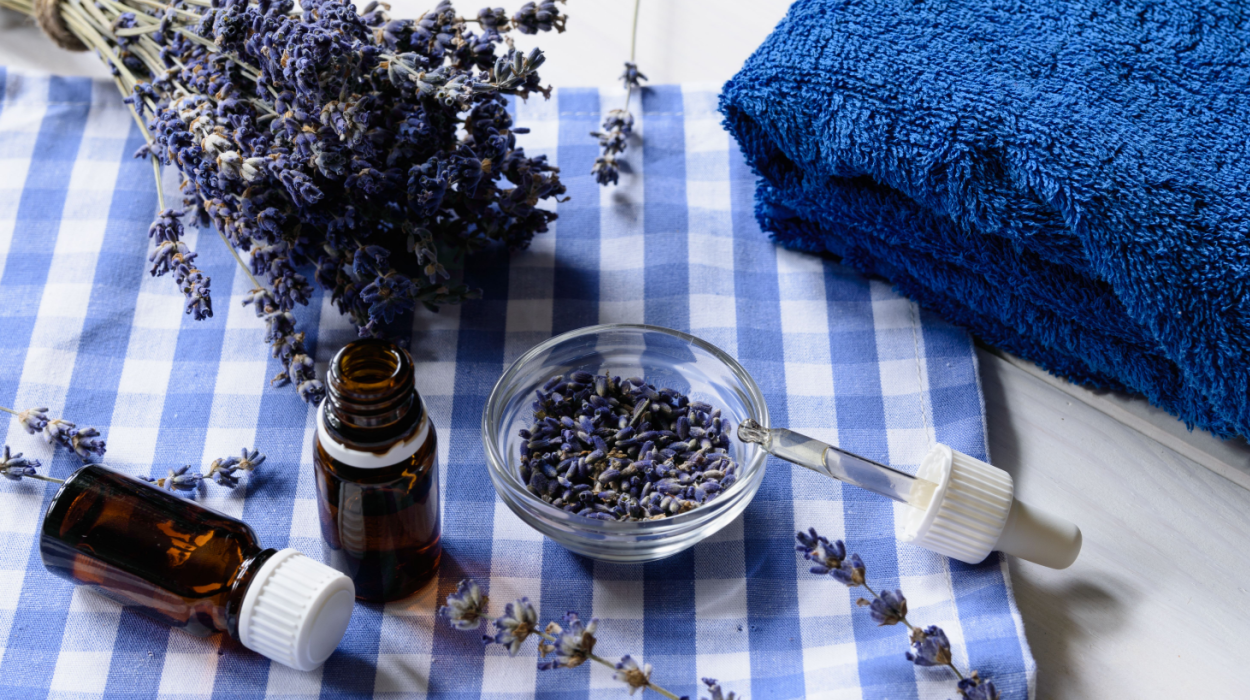 Expert's opinion
Expert's opinion
Expert's opinion
The article is a subjective view on this topic written by writers specializing in medical writing.
It may reflect on a personal journey surrounding struggles with an illness or medical condition, involve product comparisons, diet considerations, or other health-related opinions.
Although the view is entirely that of the writer, it is based on academic experiences and scientific research they have conducted; it is fact-checked by a team of degreed medical experts, and validated by sources attached to the article.
The numbers in parenthesis (1,2,3) will take you to clickable links to related scientific papers.
How To Use Lavender Oil For Anxiety: Guides & Benefits 2024

You may recognize the scent of lavender from many of your home care products, such as soaps, candles, and air fresheners. This is because lavender oil has positive impacts on the brain and nervous system, enhancing mood, relaxation,[1] and reducing symptoms of anxiety. Indeed, lavender oil is one of the best natural remedies for anxiety.
Not surprisingly, lavender oil also has a calming effect on the physical body that can induce healthy sleep. This article will discuss how the scent of lavender works to minimize stress and how to use lavender essential oil for anxiety and sleep, as well as other for other purposes.
How To Use Lavender Oil For Anxiety?
You can apply lavender oil to almost any part of the body and do not need a carrier oil, such as coconut oil, to dilute it, or you can add the scent of lavender to your home. Some common places to put a few drops of lavender include:
- On the wrists.
- On the temples
- Behind the ears.
- Under the nose.
- On your pillow.
- In your diffuser.
How To Use Lavender Oil For Anxiety & Sleep?

Incorporating lavender oil in your nightly routine may help you get better sleep if you have anxiety. If you’re curious how to use lavender oil for anxiety and sleep, consider the following ways to experiment with lavender essential oil from the comfort of your home.
You can use these methods if you have trouble sleeping or are prone to anxiety, or you can use them on an as-needed basis. For the latter, simply reach for the lavender oil when you’re feeling anxious or restless, apply to any of the areas listed below, breathe deeply to inhale the scent, and enjoy a sense of calm.
You may also wish to combine the use of lavender oil with breathing exercises or herbs for anxiety to get additional stress-reducing benefits.
Rub On Your Wrists
Day or night, you can get a sense of calm by placing a few drops of lavender oil on your wrists. Many people will place the drops directly on their wrists, while others will add the drops to a cotton ball and then dab their wrists with the cotton ball. Either method can work. Once the scent is on your wrists, lift your wrists to your nose and inhale the scent as often as desired.
Rub On Your Temples
Another place to add lavender oil is on your temples. This area is the sides of your forehead. Only use a few drops, and be careful not to get any lavender oil in your eyes, as this may cause irritation. Rubbing a few drops of lavender oil on your temples can help to ease tension, promote calmness, and may reduce headaches.[2]
Rub Behind Your Ears
You can use the cotton ball method or your bare hands to place a few drops of lavender oil behind your ears. The scent will be close enough to your nose that you should be able to smell it for several hours after application and benefit from its positive effects.
Put A Few Drops Under Your Nose
If you really want to create a direct line from the lavender oil to your brain, place a few drops right under your nose, literally! The area just below the nose and right above the lips is a great spot to dab a little lavender oil when you’re feeling anxious. If you can, find a place to sit or lay down and breathe deeply while you’re taking in the scent of lavender.
Spray On Your Pillow
There’s no need to limit lavender oil to just your body. Fill an empty spray bottle with water and add about 5 drops of lavender oil to the water (you may wish to add more if you like a stronger scent). Lightly spray the lavender-infused water on your pillow (and other bedding) so that you are surrounded by the scent as you relax or drift off into sleep.
Diffuse
You can use an oil diffuser to project the scent of lavender into any room in your home or office. A diffuser is a machine that you fill with water and essential oils (in this case, lavender, but you can add any oil you wish). A diffuser works similarly to an air humidifier. It breaks down and vaporizes the oils, then diffuses them into the air.
It is thought that the therapeutic properties of the oil can be reaped by breathing in the air infused with it, which explains why lavender aromatherapy is often used as a part of many alternative medicine practices to reduce anxiety.[3]
Why Lavender Works For Anxiety Symptoms?
Lavender can help improve anxiety through a number of channels. Lavender has an anti-anxiety effect when the scent is inhaled and comes into contact with our brain’s limbic system,[4] it activates mood in positive ways. Inhaling lavender oil can also help reduce blood pressure and other stress markers.[5]
Additionally, lavender can help induce sleep, not quite as strongly as a sedative, but in a more subtle, gentle fashion. Sleep and anxiety are intricately connected, so by improving sleep, anxiety can also be minimized.
Studies show that the scent of lavender can also lower cortisol[6] in the body. Cortisol, the stress hormone, rises when we are under stress, feeling anxious, or when we sleep erratically. It goes both ways: when we alleviate stress and anxiety, or sleep more, our cortisol level lowers. By lowering cortisol, we help bring the body back into balance.
Lavender may also interact with GABA,[7] a neurotransmitter that regulates our sleep[8] and stress levels. When GABA levels are lowered, anxiety levels and anxiety-related symptoms may be lowered.
For additional natural remedies that may compliment lavender use, consider using CBD oil. Read the CBDfx reviews to learn more about one of the best CBD oils for anxiety.
Benefits Of Lavender Oil

Lavender oil can be used for many purposes and has many benefits. You can even use lavender oil for hair! Aside from the relaxation benefits of lavender oil, let’s look at a few other benefits lavender oil offers:
Pain Relief
Lavender oil has compounds that can have an analgesic, or pain-minimizing effect.[9] Do not attempt to ingest lavender oil orally as you would pain-relieving medication. Rather, use lavender oil topically, on the skin to reduce pain from headaches, sore muscles, and other minor pains, or use a diffuser for aromatherapy.
Anti-Inflammatory
Lavender oil may reduce inflammation[10] when used topically, especially if the inflammation comes from minor cuts, burns, and bug bites. Using lavender oil can have additional antimicrobial properties[11] to prevent cuts, burns, and bug bites from becoming infected.
Bug Repellent
Humans may enjoy the scent of lavender, but fortunately, many insects do not. This makes lavender oil a great alternative to toxic, manufactured fragrances and insect repellents. Put lavender oil on your skin or spray into the air to repel bugs when you’re spending time outdoors, or if you want to prevent insects coming into your home.
Is Lavender Oil Safe?
Lavender oil is generally safe for most people, but it’s best to do a patch test on your skin before using large amounts. To do this, place a few drops on your skin and see if you develop any irritation. After 24 hours, if no irritation occurs, it’s likely fine to use.
Unlike some other essential oils which can be harsh if placed on the skin undiluted, lavender oil does not need to be diluted with a carrier oil (such as coconut oil). Lavender oil can be placed directly on the skin.
You should not attempt to drink lavender oil. However, the lavender plant can be used to make lavender tea. You can find lavender tea in your local grocery store, and the tea is safe to drink.
Conclusion
Lavender oil can be used in a variety of ways that can help increase relaxation, promote better sleep, and reduce anxiety. Additionally, lavender oil may help alleviate minor aches and pains, including headaches, and can be sprayed into the air and on linen to help bring a sense of calm in any room in your home or office.
Lavender oil should be safe to use topically without a carrier oil if you are not allergic. However, it should not be ingested orally. Lavender oil may have additional benefits when used on the skin and hair, such as acting as an insect repellent, but is most commonly used to help improve sleep quality, as well as help relieve anxiety and related anxiety symptoms.
Frequently Asked Questions
No, lavender oil should not be ingested. Rather, only use lavender oil topically. However, lavender leaves can be made into tea, which can be purchased at a grocery store.
A few drops is usually enough to get the strength of scent you desire. if this is not strong enough, it is safe to add more drops.
There are many quality brands of essential oils, including Now and doTerra Essential Oils.
Usually, as long as you’re not allergic. Putting lavender oil on the face makes it easier to inhale, as well. However, be careful not to get lavender oil in your eyes or in your mouth.
No, lavender oil alone has not been proven to be effective for treating serious mental health conditions. However, it can help ease related symptoms such as anxiety, depression, and sleep disturbances.
+ 11 sources
Health Canal avoids using tertiary references. We have strict sourcing guidelines and rely on peer-reviewed studies, academic researches from medical associations and institutions. To ensure the accuracy of articles in Health Canal, you can read more about the editorial process here
- Peir Hossein Koulivand, Maryam Khaleghi Ghadiri and Gorji, A. (2013). Lavender and the Nervous System. Evidence-based Complementary and Alternative Medicine, [online] 2013, pp.1–10. doi:https://doi.org/10.1155/2013/681304.
- Payam Sasannejad, Saeedi, M., Shoeibi, A., Gorji, A., Abbasi, M. and Mohsen Foroughipour (2012). Lavender Essential Oil in the Treatment of Migraine Headache: A Placebo-Controlled Clinical Trial. European Neurology, [online] 67(5), pp.288–291. doi:https://doi.org/10.1159/000335249.
- Gong, M., Dong, H., Tang, Y., Huang, W. and Lu, F. (2020). Effects of aromatherapy on anxiety: A meta-analysis of randomized controlled trials. Journal of Affective Disorders, [online] 274, pp.1028–1040. doi:https://doi.org/10.1016/j.jad.2020.05.118.
- Peir Hossein Koulivand, Maryam Khaleghi Ghadiri and Gorji, A. (2013). Lavender and the Nervous System. Evidence-based Complementary and Alternative Medicine, [online] 2013, pp.1–10. doi:https://doi.org/10.1155/2013/681304.
- Saadet Can Çiçek, Demir, Ş., Yilmaz, D., Aynur Açıkgöz, Yildiz, S. and Ozgur Mehmet Yis (2022). The Effect of Aromatherapy on Blood Pressure and Stress Responses by Inhalation and Foot Massage in Patients With Essential Hypertension. Holistic Nursing Practice, [online] 36(4), pp.209–222. doi:https://doi.org/10.1097/hnp.0000000000000526.
- Ghaderi, F. and Solhjou, N. (2020). The effects of lavender aromatherapy on stress and pain perception in children during dental treatment: A randomized clinical trial. Complementary Therapies in Clinical Practice, [online] 40, pp.101182–101182. doi:https://doi.org/10.1016/j.ctcp.2020.101182.
- Bruni, O., Ferini-Strambi, L., Giacomoni, E. and Pellegrino, P. (2021). Herbal Remedies and Their Possible Effect on the GABAergic System and Sleep. Nutrients, [online] 13(2), pp.530–530. doi:https://doi.org/10.3390/nu13020530.
- Gottesmann, C. (2002). GABA mechanisms and sleep. Neuroscience, [online] 111(2), pp.231–239. doi:https://doi.org/10.1016/s0306-4522(02)00034-9.
- Mozhgan Rivaz, Monireh Rahpeima, Zahra Khademian and Mohammad Hossein Dabbaghmanesh (2021). The effects of aromatherapy massage with lavender essential oil on neuropathic pain and quality of life in diabetic patients: A randomized clinical trial. Complementary Therapies in Clinical Practice, [online] 44, pp.101430–101430. doi:https://doi.org/10.1016/j.ctcp.2021.101430.
- Gabriela, Luft, C., Adroaldo Lunardelli, Robson Henrich Amaral, Alberto, Fagundes, V., Fernanda Bordignon Nunes, Schuch, M., Batista, C., Machado, C., Obalski, R., Cassel, E., Aurélio, M. and Rodrigues, J. (2015). Antioxidant, analgesic and anti-inflammatory effects of lavender essential oil. Anais Da Academia Brasileira De Ciencias, [online] 87(2 suppl), pp.1397–1408. doi:https://doi.org/10.1590/0001-3765201520150056.
- Kwiatkowski, P., Łukasz Łopusiewicz, Kostek, M., Drozłowska, E., Pruss, A., Bartosz Wojciuk, Sienkiewicz, M., Zielińska-Bliźniewska, H. and Dołęgowska, B. (2019). The Antibacterial Activity of Lavender Essential Oil Alone and In Combination with Octenidine Dihydrochloride against MRSA Strains. Molecules, [online] 25(1), pp.95–95. doi:https://doi.org/10.3390/molecules25010095.



